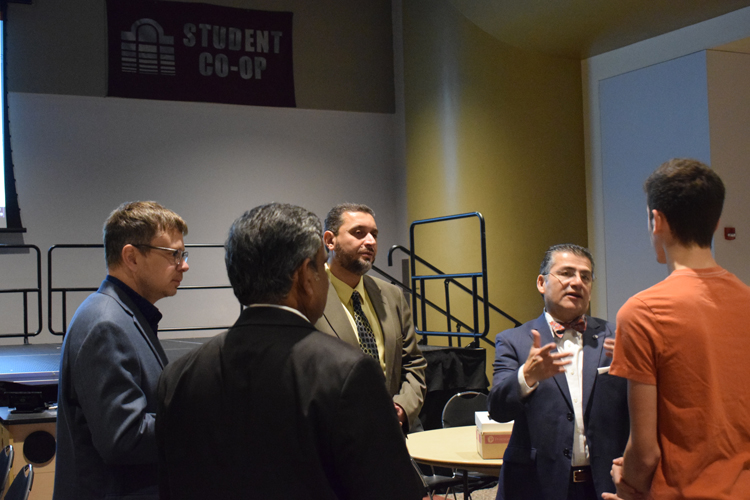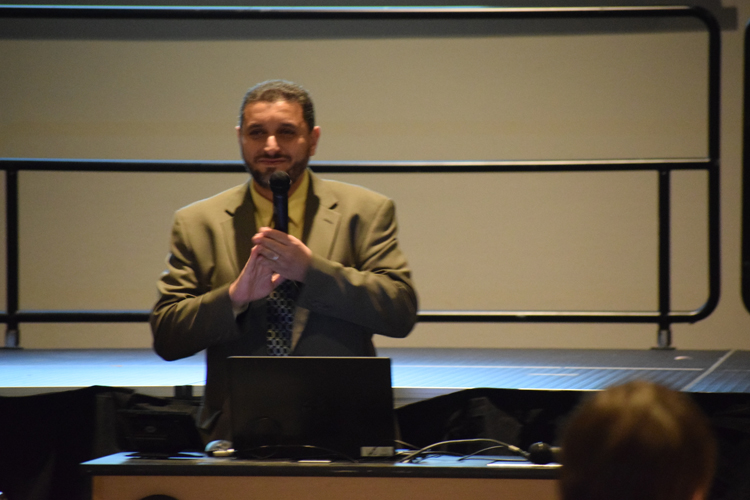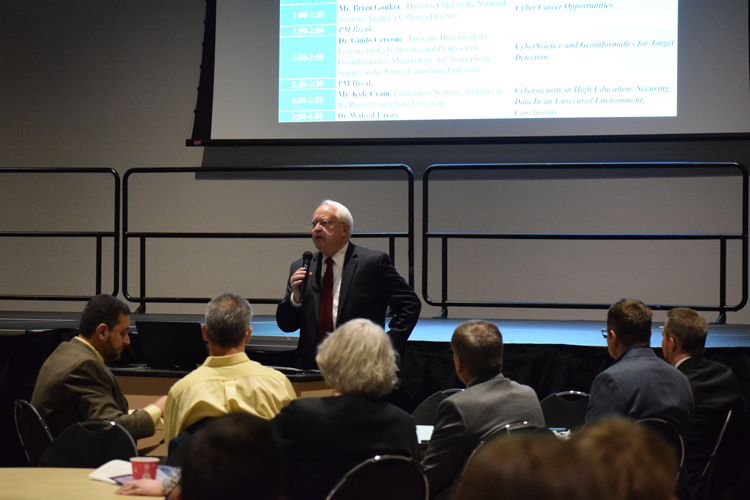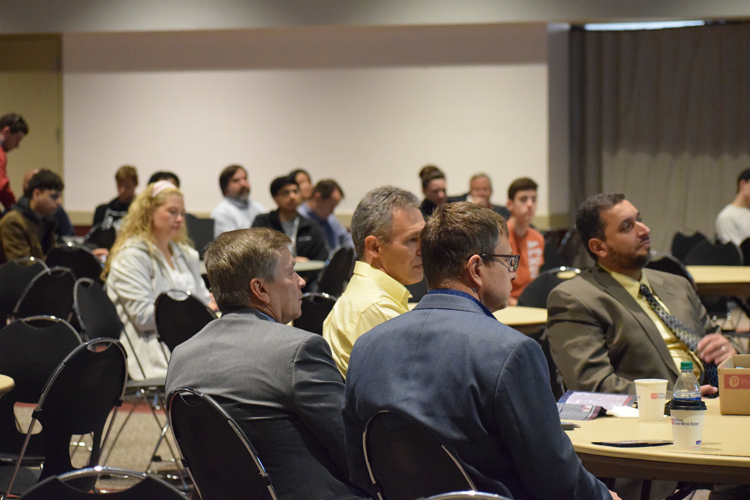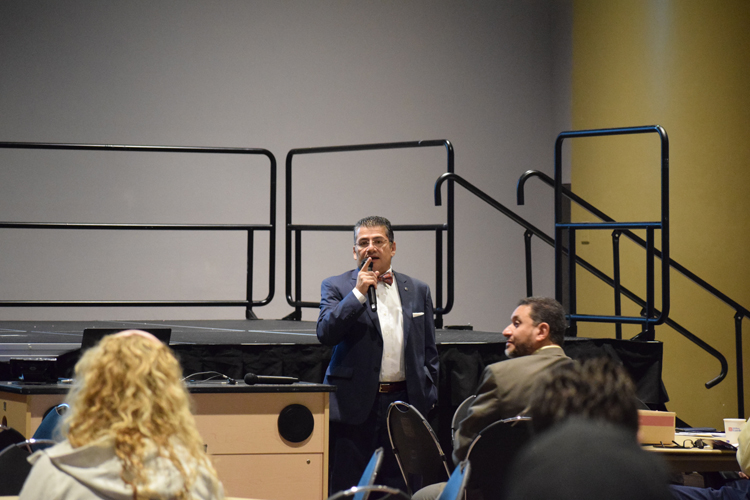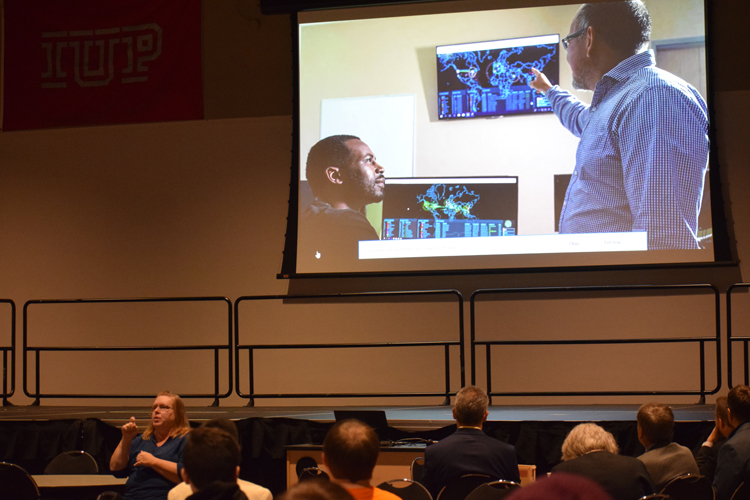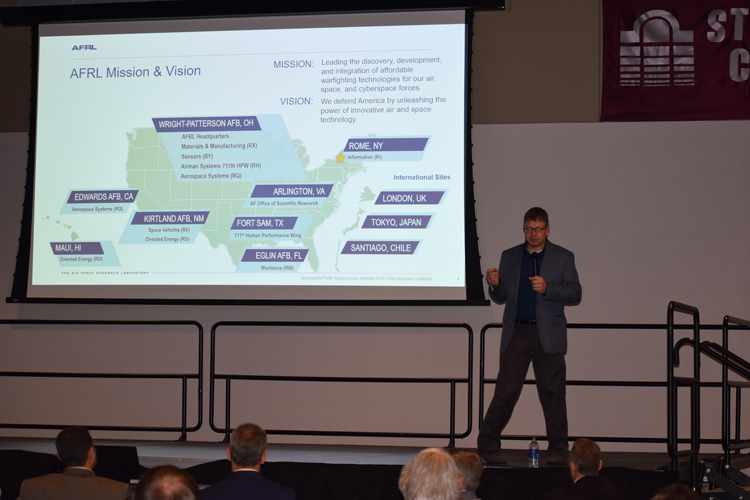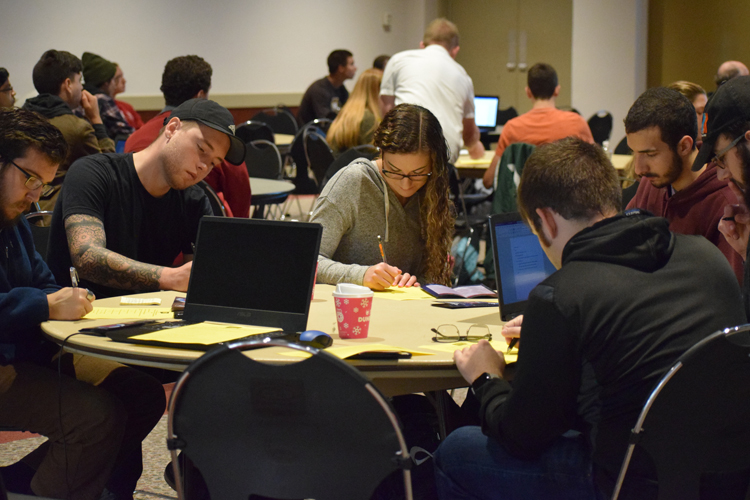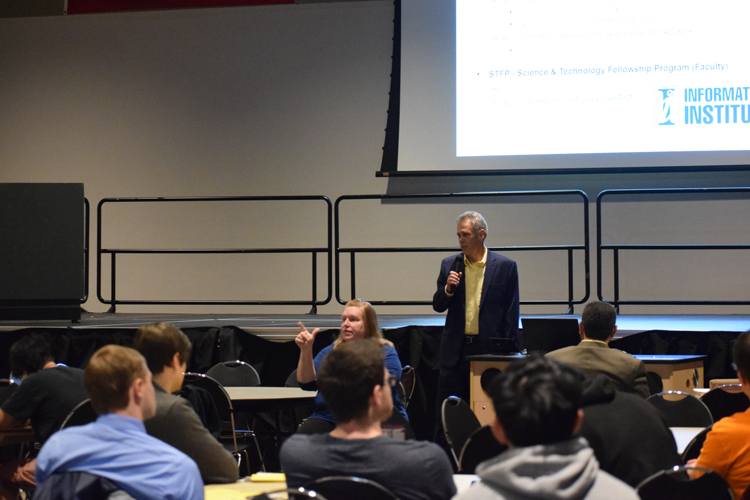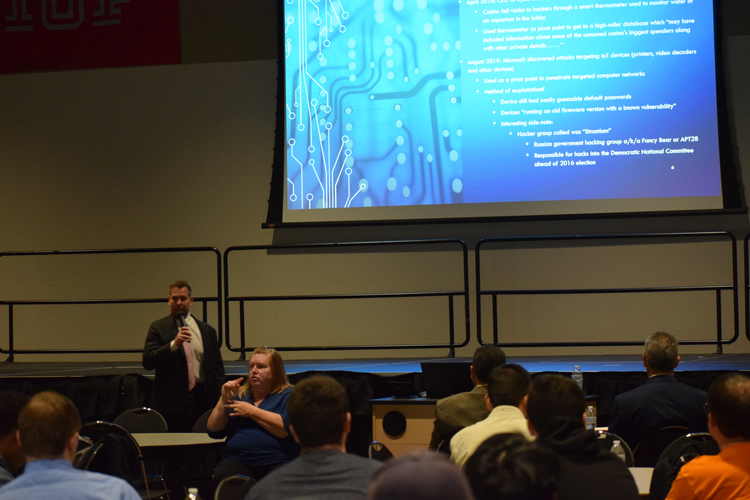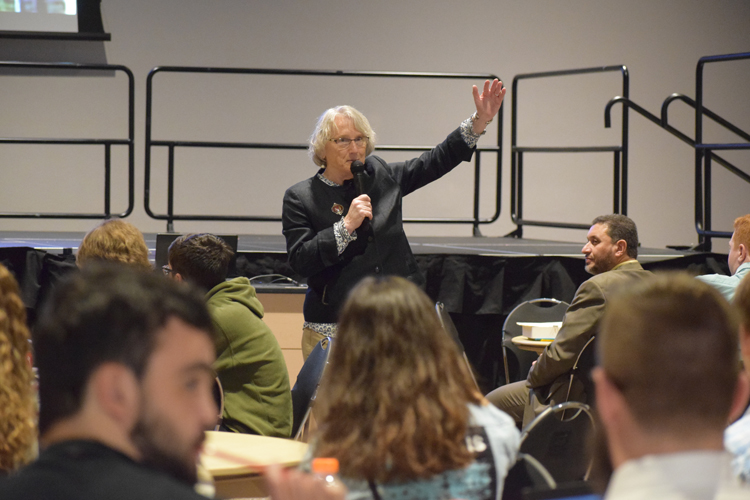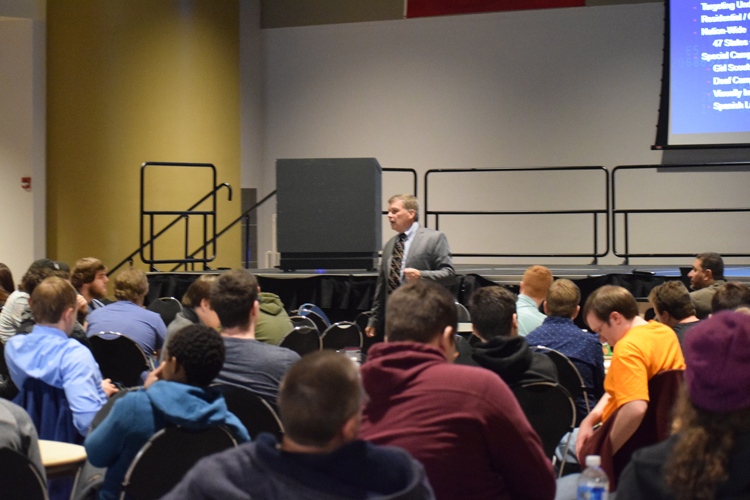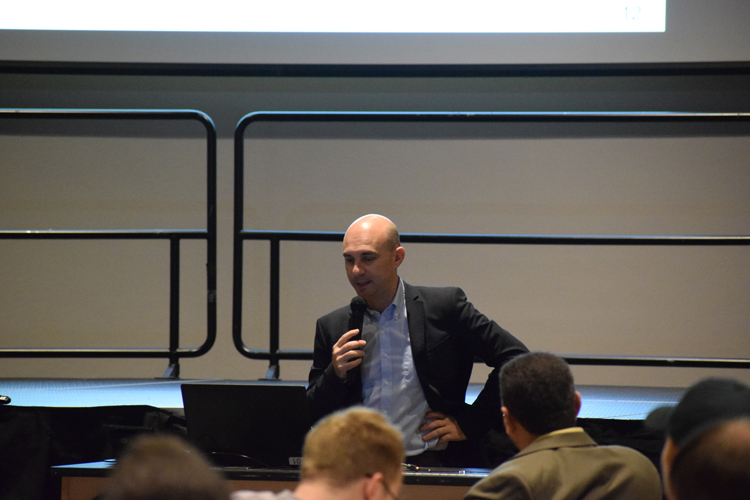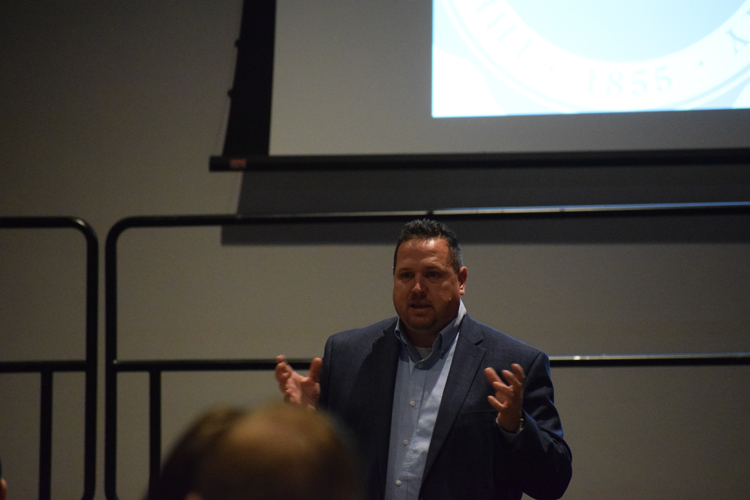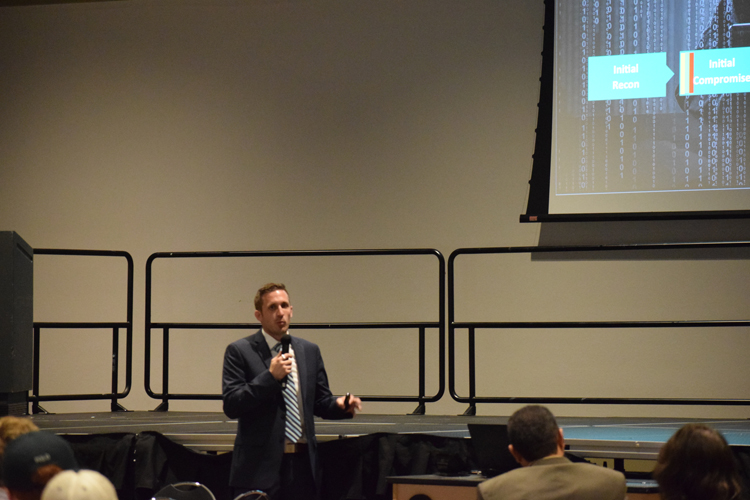Each year, the Institute for Cyber Security, in collaboration with the IT Support Services, hosts Cyber Security Day. This daylong event features nationally recognized security experts as well as speakers from law enforcement, government, security industry, and academia. Cyber Security Day is open to the public, community colleges, and neighboring universities.
The twelfth annual Cyber Security Day was held Tuesday, October 29, 2019, in the HUB Ohio Room on the IUP main campus.
Information for the Event
The 12th Annual Cyber Security Day featured presentations from Bryant Wysocki, Joel Michael Schwarz, Brian Gouker, Guido Cervone, and Kyle Crain. Topics included cyber science, IoT, cyber career opportunities, geoinformatics, and securing data. View the guest speaker and title abstract sections for more information.
Flyer | Brochure | Presentations | Photo Gallery | Schedule
Guest Speaker Biographical Information
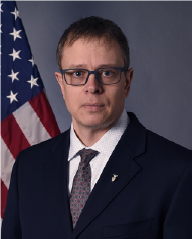 Bryant Wysocki,Senior Level executive, Technical Advisor for C4I and Cyber Systems for the Air Force and Associate Director, Information Directorate, Air Force Research Laboratory, Rome, NY
Bryant Wysocki,Senior Level executive, Technical Advisor for C4I and Cyber Systems for the Air Force and Associate Director, Information Directorate, Air Force Research Laboratory, Rome, NY
Bryant Wysocki, a senior level executive, is the technical advisor for C4I and Cyber Systems for the Air Force and associate director, Information Directorate, Air Force Research Laboratory, Rome, New York. As the recognized national/international authority on C4I and cyber systems, Wysocki provides technical oversight of these areas for the Air Force and advice on C4l and cyber systems to the highest level Air Force and government officials.
The mission of the Information Directorate is to lead the discovery, development, and integration of affordable warfighting information technologies for our air, space, and cyberspace multi-domain forces. The directorate consists of more than 1,200 onsite military, civilian scientists, engineers, and support personnel with an annual budget greater than $1.8 billion. Wysocki evaluates technical approaches and develops transition strategies for directorate technologies and serves as the senior scientist liaison to external national and international partners across government, academia, and industry.
Wysocki started his active duty career with the Air Force as a nuclear weapons technician in 1991 and served in numerous technical and operational positions throughout his service as a development engineer and later as a civilian scientist. Previously, as Information Directorate chief engineer, Wysocki was responsible for the development and implementation of tailored engineering policies, processes, and technical programs across the directorate's broad spectrum of information science research and development. He served the directorate as the primary authority on systems engineering and technology program management and provided technical oversight on directorate programs and engineering workforce development. Wysocki is a retired Air Force officer with experience in industry, academia and government. He has a broad span of technical leadership experience with a diverse background in military operations, acquisitions, logistics, maintenance, program management, systems engineering, engineering physics, fundamental research, and technology development.
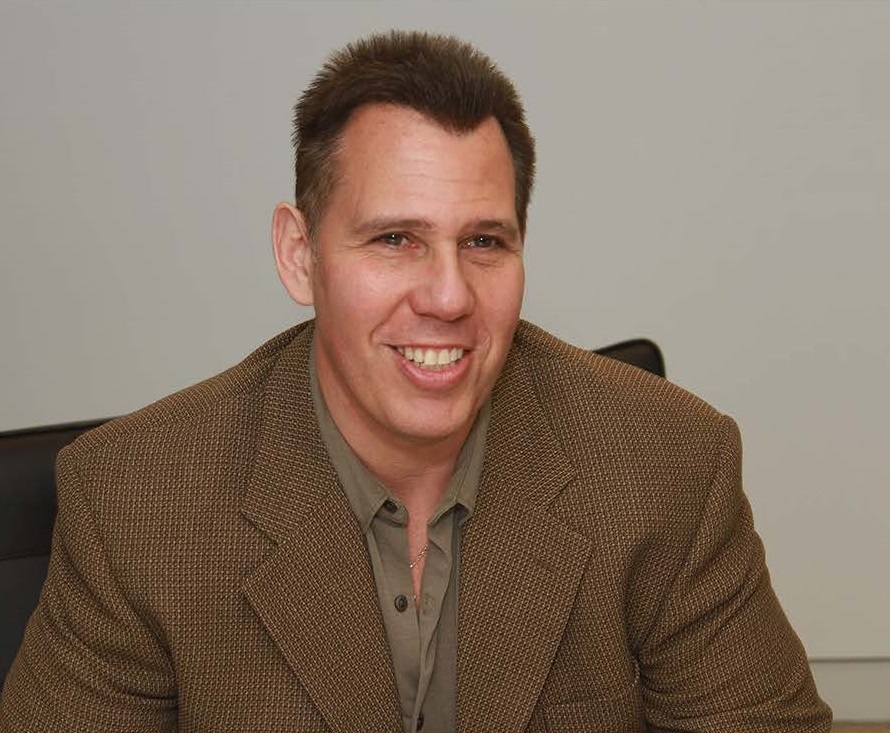 Joel Michael Schwarz, Senior Principal for Global Cyber Risk, and Associate Professor at Albany Law School
Joel Michael Schwarz, Senior Principal for Global Cyber Risk, and Associate Professor at Albany Law School
Joel Schwarz is currently senior principal for Global Cyber Risk LLC, a technology and advisory services firm that provides first tier cybersecurity services to both large corporations and small and mid-sized businesses. GCR has earned industry respect for its expertise in internationally accepted best practices and standards for cybersecurity programs. Schwarz is also an associate professor at Albany Law School, where he developed and now teaches graduate-level courses on cybercrime, cybersecurity, and privacy.
Prior to Global Cyber Risk, Joel served as senior director for BSA| The Software Alliance, where he was in charge of BSA's Internet Enforcement program, combating internet-facilitated software infringement via multiple online channels. At BSA, Schwarz was also responsible for overseeing BSA's data analytics efforts worldwide and was a member of BSA's Global Data Protection Steering Committee, responsible for ensuring compliance with GDPR and BSA's privacy principles and policies. Prior to BSA, Schwarz served as the National Counterterrorism Center's first Civil Liberties and Privacy officer, standing up and overseeing the NCTC Civil Liberties and Privacy Office. Given his experience with standing up a privacy office within NCTC, Schwarz was also selected to help standup the Office of the Director of National Intelligence's Cyber Threat Intelligence Integration Center, established by presidential memorandum in February 2015 as the federal lead for all intelligence support in response to significant cyber incidents.
Before joining the ODNI, Schwarz was an attorney with the United States Department of Justice's Computer Crime and Intellectual Property Section, prosecuting cases involving the use of the internet, and providing internet investigative/prosecution training and technical assistance to governments and law enforcement around the world. Prior to the Justice Department, Schwarz worked as counsel on e-commerce for MetLife, and served as the New York State Attorney General's special counsel for Internet Matters, and assistant attorney general with the Attorney General's Internet Bureau. Schwarz received his law degree from Albany Law School, cum laude, and received his undergraduate degree from the State University of New York Binghamton, cum laude. He subsequently completed a certification in Advanced Information Technologies from New York University.
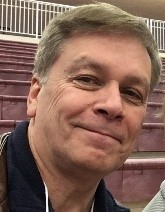 Brian Gouker, Division Chief in the National Security Agency's College of Cyber
Brian Gouker, Division Chief in the National Security Agency's College of Cyber
Brian Gouker is a division chief in the National Security Agency's College of Cyber. He is responsible for several NSA and national programs. Brian directs the Centers of Academic Excellence (CAE) in Cyber Defense and Cyber Operations programs, the GenCyber K-12 cyber summer camp initiative, a highly selective NSA technical summer internship program, the DoD Cybersecurity Scholarship Program, and manages advanced cyber education programs for NSA civilians and US Cyber Command military forces. Brian is also the US government's senior representative to the NATO Multinational Cyber Defense Education and Training Project which is building the strategy for International Military Cyber workforce development.
Brian is the past visiting professor and the first-ever chair for Cyber Studies at the US Army War College. He has completed external assignments at the FBI, the Defense Information Systems Agency (DISA), and with private industry. Brian was a two-term member of the NIST Information Systems Privacy Advisory Board (ISPAB), a government/academia/industry committee which provided advice to various government entities. Brian has also held numerous technical, leadership, advisory, and liaison cyber and intelligence positions across NSA.
A retired Air Force officer, Brian holds technical and advanced degrees from the University of Texas at Austin, Houston Baptist University, and the US Army War College. Brian is fluent in American Sign Language and serves as a Special Olympics kayak coach.
Guido Cervone,Associate Director of the Institute for CyberScience and Professor of Geoinformatics, Meteorology and Atmospheric Science at the Pennsylvania State University
 Guido Cervone is Associate Director of the Institute for CyberScience and Professor of Geoinformatics, Meteorology and Atmospheric Science at the Pennsylvania State University. He also holds the appointments of Affiliate Scientist at the National Center for Atmospheric Research (NCAR). He received a Ph.D. in Computational Science and Informatics in 2005, and M.S. and B.S. in Computer Science in 2000 and 1998. His expertise is in geoinformatics, machine learning, and remote sensing, and his research focuses on the development and application of computational algorithms for the analysis of remote sensing, numerical modeling and social media spatio-temporal "Big Data.
Guido Cervone is Associate Director of the Institute for CyberScience and Professor of Geoinformatics, Meteorology and Atmospheric Science at the Pennsylvania State University. He also holds the appointments of Affiliate Scientist at the National Center for Atmospheric Research (NCAR). He received a Ph.D. in Computational Science and Informatics in 2005, and M.S. and B.S. in Computer Science in 2000 and 1998. His expertise is in geoinformatics, machine learning, and remote sensing, and his research focuses on the development and application of computational algorithms for the analysis of remote sensing, numerical modeling and social media spatio-temporal "Big Data.
 Kyle Crain, information Security Architect at the Pennsylvania State University
Kyle Crain, information Security Architect at the Pennsylvania State University
Kyle Crain is the information security architect and team lead for the Consulting and Architecture group within the Office of Information Security (OIS) at Pennsylvania State University, University Park. Kyle has worked at Penn State for 11 years and has been involved with the Office of Information Security for eight years. During his time with OIS, he worked on a variety of key initiatives and services as a network security analyst and cybersecurity engineer before being named the information security architect. Kyle believes in balancing security with usability to support the goals of the university and that security cannot be a one size fits all approach. He enjoys building relationships with university personnel to understand their needs and help design approaches that are both secure and allow work to continue without introducing unnecessary complexities. Currently, the key initiatives his group is responsible for include: cloud security, Authority to Operate (ATO), Office 365 data security, and design and build of secure enclave environments. In his free time, Kyle likes to spend time with his wife and two children, playing golf in the warmer months, and skiing in the winter.
Titles and Abstracts
Bryant Wysocki,Senior Level executive, Technical Advisor for C4I and Cyber Systems for the Air Force and Associate Director, Information Directorate, Air Force Research Laboratory, Rome, NY
- Title:Cyber Science in an Exponentially Changing World
- Abstract:Today's rate of technology advancement and fast capability adoption raises new challenges in security and assurance. This talk examines the challenges associated with rapid government deployment of emerging technologies and considers alternatives to current acquisition methods. The material also includes a brief overview of the Air Force Research laboratory, Information Directorate, and highlights technical opportunity areas for university partners.
Joel Michael Schwarz, Senior Principal for Global Cyber Risk, and Associate Professor at Albany Law School
- Title:Is IoT Safe for Me?
- In one of the most famous science fiction novels of all time2001: A Space OdysseyArthur C. Clarke painted a picture of a future filled with live streaming face-to-face phone calls and a variety of other electronic devices used in all aspects of our daily activities, all while orbiting the earth in a space station, akin to the airports of today. While we don't yet have that space station, we do have streaming face-to-face calls (Skype, Facetime, etc.), and the ubiquity of technology in our everyday lives, which we like to cumulatively refer to as the Internet of Things, or IoT. Everything from connected refrigerators to cars, to thermostats, and even to light bulbs can, and has been, connected to the internet. But with that convenience comes a cost in terms of vulnerabilities; not only because the internet always adds a new threat vector, but also due to some of the unique characteristics of IoT devices. We'll begin this talk by discussing some of the inherent vulnerabilities of IoT devices, after which we'll pivot to some of the unique issues implicated by the sensitive types of records collected by IoT devices and how they are being sought today for use in criminal prosecutions. To better understand the legal context under which access to these records is being sought, we'll also spend a bit of time exploring the Fourth Amendment right to a "Reasonable Expectation of Privacy," and how that comes up in the context of law enforcement access to IoT records (from your pacemaker, Amazon Echo device, etc.). Finally, we'll delve into an interesting and evolving area of technologyspecifically, data collected by cars at the time of a crash, usually by an airbag deployment type systemwhich has led to a split of opinion between the state courts that have considered this question to date, after which we'll explore together the ways that the Fourth Amendment might apply in those types of cases going forward.
Brian Gouker, Division Chief in the National Security Agency's College of Cyber
- Title: Cyber Career Opportunities
- Abstract:There are vacant cyber jobs open in the United States today. Both the federal governmentand private industry are aggressively hiring.Cyber and cyber security has entered the mainstream and industriessuch as health care, finance, manufacturing and retail all hire cyber security professionals to protect valuable information from cyber breaches. This presentation will discuss cyber opportunities at the National Security Agency, the federal government, and private industry.
Guido Cervone, Associate Director of the Institute for CyberScience and Professor of Geoinformatics at Pennsylvania State University.
- Title:CyberScience and Geoinformatics for target detection
- Abstract: This talk will focus on CyberScience as a new fundamental new paradigm for the science enterprise. It will present the Institute for CyberScience at the Pennsylvania State University, discussing the importance of the computational cyberinfrastructure and some selected Earth science applications. The main emphasis will be on numerical modeling at scale and the analysis of large remote sensing data..
Kyle Crain, information Security Architect at the Pennsylvania State University
- Title:Cybersecurity in High Education: Securing Data In an Unsecured Environment
- Abstract:Higher Education is a unique and challenging place for the cybersecurity field. Working in this environment poses many unique obstacles vs. being a cybersecurity practitioner in the corporate world. In this session I will give an overview of what a cybersecurity team at a leading research institution looks like and discuss the strategies and initiatives we use on a daily basis to secure sensitive data being generated by our researchers. I will present some attack trends and statistics and talk about why a large campus is like a bustling city chalk full of all kinds of data that attackers try to exfiltrate on a daily basis. We will draw comparisons and contrast how security is implemented in higher educations vs. corporate entities to help you gain some insight as to how different sectors require different skill sets. I will also discuss different career paths to landing a career in this exciting, dynamic, and in-demand field.
More Information
For more information about Cybersecurity Day at IUP, please contact Waleed Farag, Director, Institute for Cybersecurity, at farag@iup.edu, 724-357-7995.
